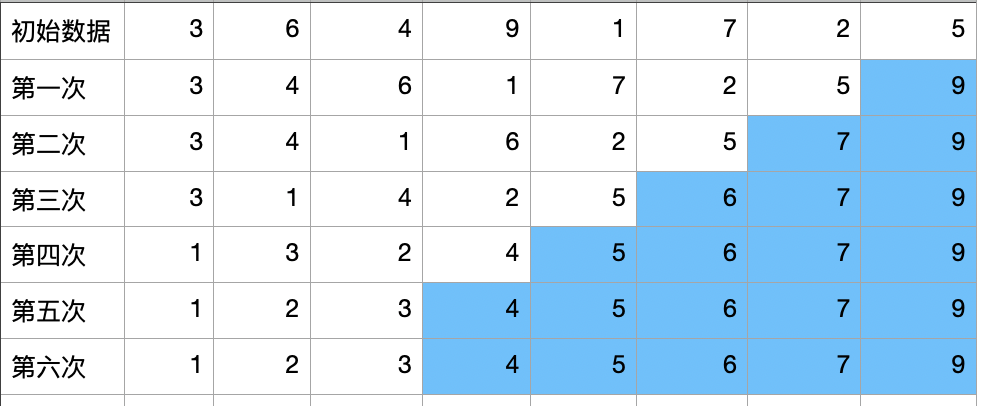冒泡排序
2021-05-29 04:02
标签:i++ 循环 http build str ++ info 列表 end 执行结果 每次找出最大的一个元素移到最右边。 代码需要排序10次,当时上面的过程可以看到只需要5次即可完成这个排序,这是一个优化点,当内循环的执行完一次排序后如果没有发生数据交换(本例中的第五次),则说明整个列表已经全部排序排序完成了。 对上面的代码做一个改进。 执行结果 时间复杂度O(n^2)。空间复杂度O(1)。 属于稳定性排序,当两个数字相同的时候,其位置是不会发生改变的。 冒泡排序 标签:i++ 循环 http build str ++ info 列表 end 原文地址:https://www.cnblogs.com/Brake/p/14772518.htmlCode
package kb.algorithm;
public class BubbleSort {
public static void main(String[] args) {
int[] a = new int[]{3, 6, 4, 9, 1, 7, 2, 5};
sort(a);
StringBuilder sb=new StringBuilder(20);
for (int i = 0; i a[j + 1]) {
int temp = a[j];
a[j] = a[j + 1];
a[j + 1] = temp;
}
}
}
}
}
1,2,3,4,5,6,7,9,
分析改进

package kb.algorithm;
public class BubbleSort {
public static void main(String[] args) {
int[] a = new int[]{3, 6, 4, 9, 1, 7, 2, 5};
sort(a);
StringBuilder sb = new StringBuilder(20);
for (int i = 0; i a[j + 1]) {
int temp = a[j];
a[j] = a[j + 1];
a[j + 1] = temp;
switched = true;
}
}
executedCount++;
if (!switched) {
break;
}
}
System.out.println("executedCount" + executedCount);
}
}
executedCount6
1,2,3,4,5,6,7,9,
复杂度分析